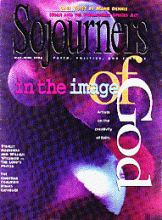GOD'S CREATIVITY can be reflected in innumerable ways in our world, but artists have a particular role. Artists often instinctively sense changes in society first. In this way the artistic and the prophetic often go hand in hand. In the Bible there are hints that Hebrew Testament prophesy was linked with music or poetry. And, indeed, Jesus' words were often phrased in a poetic way.
On my own journey, I have a strong vocational sense of needing to tell the story of those who are forgotten. Sometimes I think of my songs as parables, sometimes as paintings, and sometimes simply as stories. Once, in Zululand near the Mozambique border, I was introduced to a blind musician called Zacariah, who chronicles the history of his people in song. In Britain, the first known Christian troubadour was Caedmon, who the Venerable Bede mentions in the sixth century as someone who traveled around with a Celtic harp and sang about the beauty of God's creation and spirituality.
I am invited by church and other groups to visit different parts of the world. Often I meet people who feel forgotten because they're in places of hunger or poverty or conflict. There I try to encourage the local Christians and peacemakers and to bring back their stories to Western societies in order to motivate people to link arms with them in the struggle for their humanity.
As an Episcopal priest, I have a particular concern for the Christian community. Too much religion is internalized, pietistic, and selfish-in contrast with the incarnational message of God coming to earth. Many worship recordings are triumphalist and ignore how personal faith relates to life and the hurts of a needy world.
Read the Full Article

